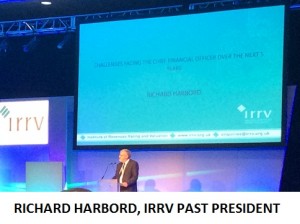Uncertainty, restructuring, budget cuts and constant change were recurring themes from speakers at this year’s IRRV Telford Conference. There was even talk of some Local Authorities potentially going into administration.
But the real hot topic was driven by the Chancellors announcement the day before the conference, that Councils would be able to retain up to 100% of business rates by 2020. Whilst this may alleviate some of the financial issues Councils are facing, there was much interest in how this decision would impact other grants and funding which central government currently provide to Local Authorities.
 Local Authorities need more expertise on Business Rates
Local Authorities need more expertise on Business Rates
Past IRRV President, Richard Harbord had a number of observations he was keen to share on the topic, first and foremost was his belief that Local Authorities had lost interest in business rates in 1990. He felt that many Councils have not increased their expertise in this area since that time and cited instances where some properties have not been added to either central or local lists.
Financial implications of 100% Business Rates retention
Richard says that expertise is needed to meet the challenges coming head on and noted that even smaller authorities were seeing returns on the costs associated with inspections. However Richard was quick to point out that it may well mean the removal of Whitehall grants and expectations by Central Government that Councils will take on more localised services such as police, health and social services.
There is still a lot of uncertainty around business rates and particularly in the area of appeals. Richard commented on one authority which had lost 25% of its value of business rates retained based on an appeal and noted that two Canadian authorities went bankrupt thanks to appeals they had to pay back, dating to 2005.
The importance of Council reserves
English and Welsh Authorities are not quite there yet however and Richard noted that Council reserves continue to rise and as at the end of 2014/15 Local Authorities held £21.4Bn in reserves which could help meet a number of both unforeseeable and planned for cut backs.
Richard says that Councils need to continue to keep building their reserves and earmark some for business rates, particularly as it is difficult to get an accurate forecast on what the revaluation process might uncover.
 The cost of rate avoidance
The cost of rate avoidance
David Magor, Chief Executive of the IRRV, commented in his session that S151 officers need to understand the importance of non-domestic rates (NDR), they don’t know enough about business rates and quality decisions need to be made, based on the law. Local Authorities’ need to protect themselves and S151 officers need to get a hold of this issue. Working with the Valuation Office Agency and ratepayers must be a priority to get things right. David believes poor decisions in Billing Authorities means real losses and estimates rate avoidance accounts for nearly £3bn.
The new dawn of non-domestic rates
When it comes to the new dawn of NDR, David questioned how will it be controlled and what does 100% retention actually mean. David also queried whether the central list should be abolished with an emphasis on localised discretion. He also asked if there was a case to broaden the tax base in this area as well with land tax on vacant sites and agricultural land for instance.
These were just some of the observations and questions posed during the event, the real repercussions of this decision are yet to be revealed and we will be posting any news and updates on this in the coming months.
